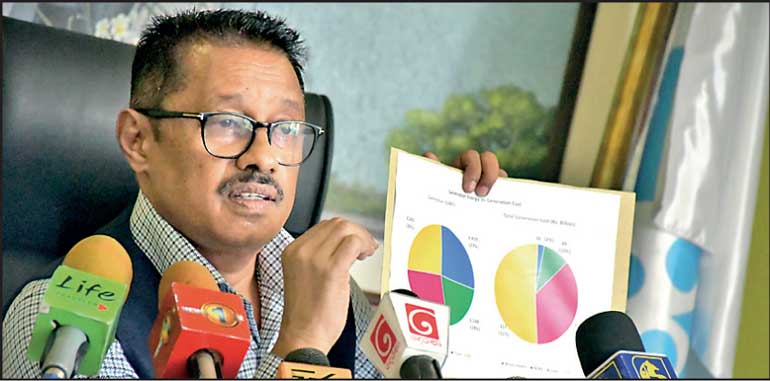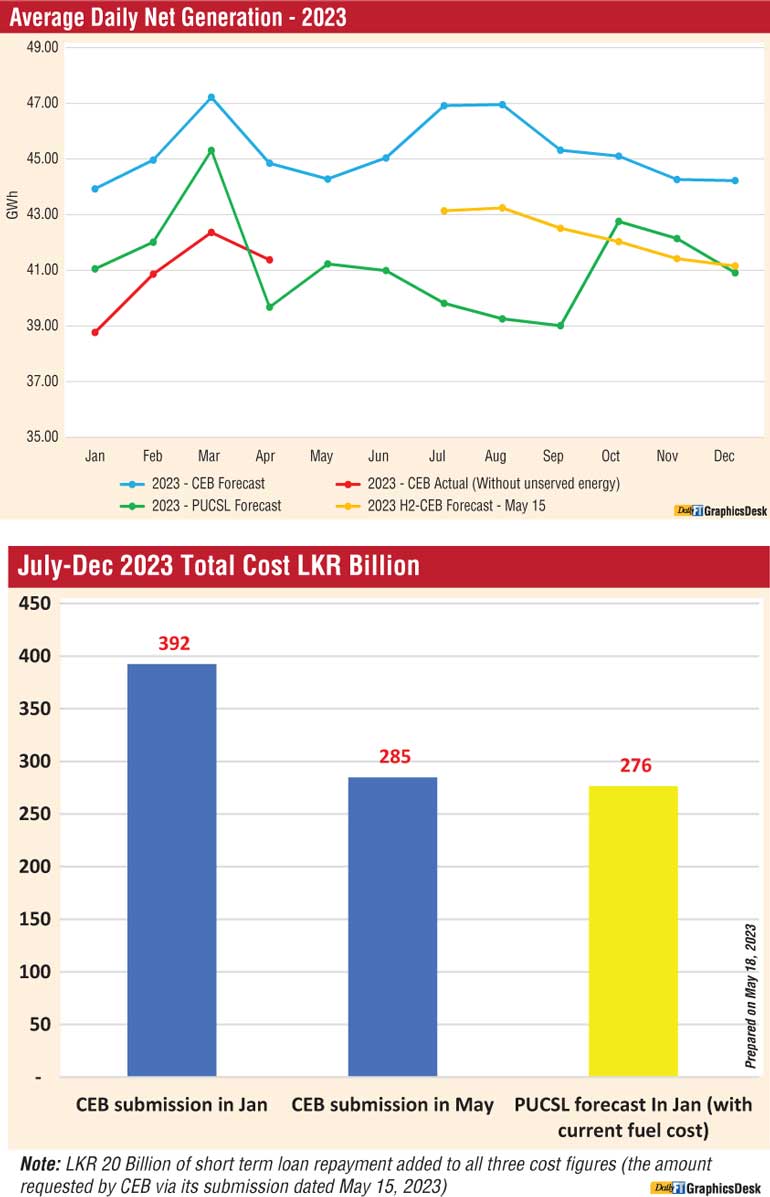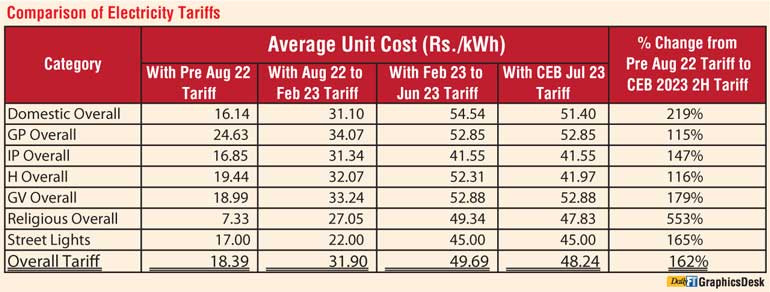PUCSL says electricity tariffs should be reduced by at least 27%
Friday, 19 May 2023 00:00 – – 29
 PUCSL Chairman Janaka Ratnayake points to a chart during the media briefing yesterday
PUCSL Chairman Janaka Ratnayake points to a chart during the media briefing yesterday


- Dismisses CEB proposal to reduce by 3% based on ‘incorrect information’ as not acceptable
- Requests CEB to submit fresh proposal with actual data
- Estimates actual CEB expenditure for supply of electricity will reduce by Rs. 107 b in next six months based on cost factors and drop in demand
- PUCSL Chief says CEB accepted its original demand forecast was off mark
The Public Utilities Commission of Sri Lanka (PUCSL) yesterday declared that electricity tariffs should be reduced by at least 27% and dismissed the proposal for a 3% cut by the Ceylon Electricity Board (CEB).
PUCSL Chairman Janaka Ratnayake alleged that the CEB proposal was by concealing the correct cost data. Therefore PUCSL has informed CEB to submit the corrected data to reduce the electricity tariffs on par with the actual cost reduction.
“The electricity tariff was increased by 66% this February based on fake data. At that time, the tariff should have been increased by only 35%,” charged Ratnayake at a media briefing.
He recalled that at the last tariff revision, PUCSL pointed out that the electricity demand of 16,550 gigawatts estimated by the CEB was incorrect.
“Our estimate was that electricity demand this year would be limited to 15,050 gigawatt hours. In April, CEB realised that our estimate was correct and that their demand was overestimated. Accordingly, CEB informed in writing that the estimated demand for the coming period of the year is 15,264-gigawatt hours,” Ratnayake said.
He pointed out that if electricity tariffs were set and implemented according to PUCSL estimates, the situation electricity users are facing today would not have arisen.
“Compared to the decrease in electricity demand, the cost of providing electricity should also decrease. The CEB initially estimated an expenditure of Rs. 392 billion from July to December 2023. But the CEB now says that Rs. 285 billion will be spent for the next 6 months.
“According to our calculation, the actual cost of electricity supply will be reduced by Rs. 107 billion. If that is the case, the electricity tariff should be reduced by at least 27% as a whole for the upcoming period. Otherwise, by reducing tariffs by 3% only for a limited number of customer groups based on fake data, will not do the justice for all electricity consumers. The CEB would not get the expected income too,” PUCSL Chairman revealed.
In a revision of electricity tariffs, all the proposals should be submitted in accordance with tariff methodology (equation) approved under the Sri Lanka Electricity Act. According to methodology only the reasonable cost of supplying electricity can be charged from the electricity consumer. Ratnayake pointed out that contrary to the approved method, CEB is trying to implement the tariff revision proposal even this time, by including proposals to recover the loans received by CEB from the electricity consumers.
“According to the tariff methodology, all data should be submitted correctly. Only approved costs recoverable from the customer can be included in the total cost. But this proposal has not been submitted with the data approved under tariff methodology. In calculating charges based on cost, the charges should be adjusted in such a way as to recover the actual and minimum cost. For example, although the market price of a litre of naphtha is Rs. 220, the price of a litre of naphtha purchased for the Kelanitissa power plant has been calculated as Rs. 266. Then the unit cost will be Rs. 69.53. Moreover, if this plant uses diesel to generate electricity, the unit cost will be reduced to Rs. 68.14 per unit. But the estimate has been calculated using naphtha. Calculating electricity charges based on high cost is against the Electricity Act. The CEB has been informed to share the corrected data,” Ratnayake said.
He pointed out that energy supply can play a big role in order to quickly activate the economic condition of the country.
“When the burden of electricity and fuel is heavy, it affects not only the public but also the industrialists. Fuel demand decreased due to high fuel prices. Demand for electricity has decreased due to high electricity tariffs. Energy should be provided at a reasonable price thereby uplifting the economy as a whole. The prices should be brought down fairly and immediately,” PUCSL Chairman emphasised.
He noted that fuel prices have gone down in the world market and the exchange rate is better than last year.
“Since there is an opportunity to provide relief for people given the changes in the market, the energy prices should be reduced based on the actual cost. After submitting the necessary information related to the tariff revision proposal presented by CEB, we have planned to hold a public consultation on the electricity tariff revision proposal and take the final decision based on the opinions of the people,” PUCSL Chief Ratnayake added.
